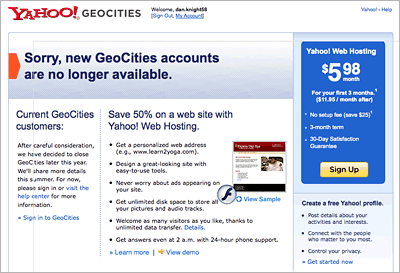Back in 1998, I had a Geocities website. So did my kids and
their friends - and my friends. If you were online a dozen or so years
ago, there's a good chance you had a Geocities site as well, or at
least with one of Geocities' rivals, of which there were several in the
free Web hosting space.
Geocities and its contemporaneous rivals Angelfire, Tripod, Fortune City, (all still around) et
al., were essentially the FaceBook, MySpace, and YouTube of their time, a primitive and
somewhat cumbersome prototype of social networking.
The Geocities Story
Geocities was launched by developers
David Bohnett and John Rezner in late 1994 as Beverly Hills Internet
(BHI) and adopted the Geocities name in 1996. With Geocities, anyone
with a computer and Internet access could establish a presence on the
World Wide Web - for free. GeoCities' particular wrinkle was "cyber
neighborhoods" - grouping sites in categories of interest, as well as
offering users a set of site creations tools and proto-social
networking features like news, chat rooms, and polls.
It was a bit intoxicating for an Internet newbie, although (as with
FaceBook, etc.) most of the content tended to be banal and trivial.
Reportedly, Geocities has hosted more than 3.5 million websites hosted
on its service.
Personally, I soon got bored with the novelty and moved on to other
things, and now, a decade plus on, Geocities is moving on and out.
The End Is Near

Late last
week, Yahoo! Inc.,
which first partnered with Bohnett and Rezner in 1998 and purchased
Geocities from them with much fanfare in 1999 for $3.57 billion,
announced
that GeoCities will close later this year.
"We have decided to discontinue the process of allowing new
customers to sign up for GeoCities accounts as we focus on helping our
customers explore and build new relationships online in other ways. We
will be closing GeoCities later this year."
If you have a Geocities website, you are offered the alternatives of
either upgrading to Yahoo! Web Hosting for a fee (starting at $5.98 per
month) or just letting your Geocities site and its content evaporate
later this year when the service is terminated.
However, there is no reason to panic if you have a Geocities site
with content you want to salvage. The Yahoo! notice also says: "You
don't need to change a thing right now. We'll provide more details
about closing GeoCities and how to save your site data this summer, and
we will update the help center with more details at that time."
What Geocities looked like in 1996.
Last evening I mentioned the Geocities shutdown on the phone to my
daughter, who was a Geocities fan and tenant back in the day. She
thought it was unfortunate to see the service go, but more from
nostalgia than inconvenience. It's a little sad, I suppose,
particularly for folks who are still active users, but Geocities' time
was arguably past, so its demise was virtually inevitable, no doubt
accelerated by the economic crisis and the scramble to monetize
Internet assets and services as much as possible. Yahoo! is struggling
for survival these days, and I wish them well.
Free Alternatives
Not to say that free website hosting is dead by a long shot. For
example, aside from the veteran services mentioned above, 50megs.com offers an eponymous 50 megabyte
service for free and larger capacities for reasonable monthly fees.
TheFreeSite.com has
several pages of free Web hosting service profiles and links.
You can also try the free-webhosts.com
"Free Webspace" website hosting services search engine, a directory
list of free web hosting providers that claims to be linked to about
300 of the best free web space hosting sites with reviews,
testimonials, and ratings, and is updated daily
According to a
report on TechCrunch, GeoCities' traffic had been falling
precipitously over the past year with ComScore tracking GeoCities
unique visitor's count in the US falling 24% in March to 11.5 million
unique visitors from 15.1 million in March of 2008, while in October,
2006 it had 18.9 million visits.
This development also begs the question of how long FaceBook,
MySpace, YouTube, and Twitter have before they hit their "best before"
date and begin an inevitable decline into oblivion, or perhaps morph
into for-fee services, being superseded in prominence by whatever "next
big thing" comes next.



